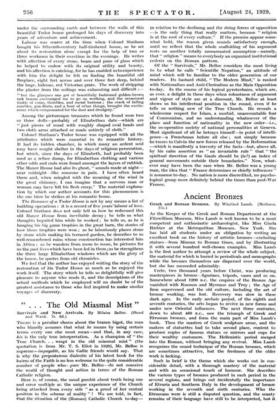. . . The Old Miasmal Mist"
THERE is a peculiar charm about the brazen bigot, the man who blandly assumes that what he means by using certain terms every one else must mean—and that, in any case, his is the only true interpretation. As a champion of "the True Church. . . wrapt in the old miasmal mist" (the -quotation is from Mr. T. S. Eliot in 1920), Mr. Belloc is supreme—impayable, as his Gallic friends would say. That is why the preposterous dialectic of his latest book for the bairns of the Faith is no less welcome to the quite considerable number of people who--pace Mr. Belloc—do not conceive the world of thought and action in terms of the Roman Catholic religion.
Here is, of course, the usual gambit about truth being one and error multiple sc. the unique experience of the Church being attacked from every side "as a proof of her central position in the scheme of reality " I We are told, in fact, that the situation of the (Roman) Catholic Church to-day- in relation to the declining and the rising forces of opposition —is the only thing that really matters, because "religion is at the root of every culture." If the premiss appear some- what bold, the reason given sounds satisfactory enough, until we reflect that the whole scaffolding of his argument rests on another totally unwarranted assumption—namely, that " religion "means to everybody an organized institutional eeeksia on the Roman pattern.
Of the "Survivals," Mr. Belloc considers the most living to be what he calls "Scientific Negation," an attitude of mind which will be familiar to the older generation of our readers. Its bastard child, "The Modern Mind," is ranked with Nationalism and Anti-Clericalism as the Main Opposition to-day. In the course of his logical pyrotechnics, which are, as ever, a delight in these days when robustness of argument and vigour of style are at a discount, Mr. Belloc at least shows us his intellectual position in the round, even if he tells us nothing new of the True Church. He reveals a wholesome respect for Islam, a morbid, unaccountable fear of Communism, and no understanding whatsoever of the place and function of nationality in the new order—i.e., the co-operative society of national personalities at Geneva. Most significant of all he betrays himself—in point of intelli- gence—a Frenchman before all else ; not simply because he traces to Calvin the new forces released by the Reformation —which is manifestly a travesty of the facts—but, above all, by his calm assertion as "an invariable rule" that "the spiritual direction of the Gauls should be (is?) an index of general movements outside their boundaries." Now, what- ever may have been the case when Mr. Belloc was a young man, the idea that " France determines or chiefly influences" is nonsense to-day. No nation is more discredited, no psycho- logical group more definitely behind the times than post-War France.






























 Previous page
Previous page